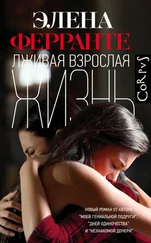Then she hung up. I stood with the receiver in my hand, incredulous. What was happening. And why had my aunt attacked me in that way. Maybe I had been wrong to say “my bracelet,” I had been out of line. And yet it was the right formulation, she had given it to me. But I had certainly not called her to get it back, I only wanted her to explain why she hadn’t kept it. Why if she loved that bracelet so much did she keep getting rid of it?
I hung up, went to lie down again. I must have had a really bad dream, which had to do with the picture of Enzo on his grave: I was overcome by anguish. And now there was that pile-up of voices on the phone, I heard them again in my mind, and only then did I understand that Vittoria was angry with me because of the meeting that morning. Evidently, Giuliana had just told her about it, but what had Vittoria seen in that story that made her so furious? Now I would like to have been present and heard word for word what Giuliana said. Maybe, if I, too, had heard her account, I would have understood what really happened in Piazza Amedeo.
The phone rang again, I started, I was afraid to answer. Then I thought it might be my mother, and I went back to the hall, cautiously picked up the receiver. Giuliana murmured: hello. She apologized for Vittoria, she sniffled, maybe she was crying. I asked:
“Did I do something wrong this morning?”
“No, Giannì, Roberto is enthusiastic about you.”
“Really?”
“I swear.”
“I’m glad, tell him that talking to him was really good for me.”
“No need for me to tell him, you’ll tell him. He wants to get together again tomorrow afternoon, if you can. We’ll go and have coffee, the three of us.”
The painful grip of my headache became tighter. I muttered:
“O.K. Is Vittoria still angry?”
“No, don’t worry.”
“Will you let me talk to her?”
“Better not to, she’s a little upset.”
“Why is she angry with me?”
“Because she’s crazy, she’s always been crazy, and she’s ruined the lives of all of us.”
VI
1.
The time of my adolescence is slow, made up of large gray blocks and sudden humps of color, green or red or purple. The blocks don’t have hours, days, months, years, and the seasons are indefinite, it’s hot or cold, rainy or sunny. Even the bulges don’t have a definite time, the color counts more than any date. The hue itself, moreover, that certain emotions take on is of unimportant duration, the one who is writing knows. As soon as you look for words, the slowness becomes a whirlwind and the colors get mixed together like the colors of different fruits in a blender. Not only does “time passed” become an empty formula but also “one afternoon,” “one morning,” “one evening” become merely markers of convenience. All I can say is that I really did manage to make up the lost year and without a great effort. I had a good memory—I realized—and learned from books more than from school. Even if I read absentmindedly, I remembered everything.
That small success improved relations with my parents, who became proud of me again, especially my father. But I got no satisfaction out of it; their shadows were like an irritating pain that wouldn’t go away, an unseemly part of me that had to be cut out. I decided—at first just to distance them ironically and then as a deliberate rejection of the parental bond—to call them by their names. Nella, increasingly malnourished and whiny, was now my father’s widow, even though he was still living, in excellent health and surronded by comforts. She continued to safeguard for him with care the things she had stubbornly prevented him from taking away. She was always available for visits from his ghost, for the phone calls he made from beyond the grave of their married life. And I was convinced that she saw Mariano from time to time only to find out what great matters her ex-husband was occupying himself with. Otherwise, clenching her teeth, she disciplined herself to a long series of daily duties, me among them. But she no longer concentrated on me—and it was a relief—with the determination she put into correcting piles and piles of homework or making love stories hang together. You’re grown up, she said more and more often, you take care of it.
I was glad to be able to come and go, finally, without too much control. The less she and my father concerned themselves with me, the better I felt. Andrea especially, ah, let him be silent. I was increasingly less able to endure the wise instructions for life that my father felt it his duty to concoct for me when we saw each other in Posillipo, if I was visiting Angela and Ida, or near my school, to eat panzarotti and pastacresciuta together. The wish that there could be a friendship between Roberto and me was miraculously coming true, so that I seemed to be guided and instructed by him, in a way that my father, too absorbed in himself and his misdeeds, had never known how to do. One night, now long ago, in the dim apartment on Via San Giacomo dei Capri, Andrea, speaking rashly, had stripped me of my confidence; Giuliana’s fiancé was kindly, affectionately restoring it. I was so proud of that relationship with Roberto that I occasionally mentioned him to my father, just for the fun of seeing how serious and attentive he became. He asked about him, he wanted to know what sort of person he was, what we talked about, if I had ever told Roberto about him and his work. I don’t know if he really respected Roberto, hard to say, I had long considered Andrea’s words unreliable. Once, I remember, he said earnestly that he was a lucky young man, who had been able to get away in time from a shit city like Naples and construct for himself a prestigious university career in Milan. On another occasion he said to me: it’s good you’re spending time with people who are better than you, it’s the only way to go up and not down. A couple of times, finally, he went so far as to ask me if I could introduce him, he felt the need to get out of the quarrelsome, petty-minded group he’d been stuck in since he was a boy. He seemed to me a small, frail man.
2.
It happened just like that, Roberto and I became friends. I don’t want to exaggerate, he didn’t come to Naples often; the occasions for meeting were rare. But bit by bit we established a little routine that, without becoming really regular, resulted in our finding a way of talking even just for a few minutes, when the opportunity arose, and always in the company of Giuliana.
At first, I have to admit, I was very anxious. Every time we met I thought I’d overdone it, that trying to keep up with him—he was ten years older than me, I was a high-school student, he taught at the university—was a presumption, that surely I had made myself ridiculous. I went over in my mind, countless times, what he had said, what I had answered, and was ashamed of every word. I heard the frivolity with which I had dismissed complicated questions and in my breast grew a sense of unease very similar to what I’d felt as a child when I did something impulsively that would certainly displease my parents. I doubted that I could have inspired any fondness on his part. In my memory, his ironic tone spilled over into explicit mockery. I recalled a contemptuous attitude I’d taken, certain parts of the conversation where I had tried to impress, and I felt cold, nauseated, I wanted to expel myself from myself as if I were about to vomit myself.
In fact, however, it wasn’t like that. Each of those encounters improved me, Roberto’s words immediately set off a need for reading and information. The days became a race to arrive at a future meeting more prepared, with complex questions on the tip of my tongue. I began to look through the books my father had left at home to find some that might be helpful for understanding. But understanding what, or whom? The Gospels, the Father, the Son, the Holy Spirit, transcendence and silence, the tangle of faith and the absence of faith, the radical nature of Christ, the horrors of inequality, violence, always carried out against the weakest, the savage, boundless world of the capitalist system, the advent of robots, the urgent need for Communism? Though his perspective was broad, Roberto was constantly moving beyond it. He held together heaven and earth, he knew everything, he blended together minor examples, stories, quotations, theories, and I tried to keep up, alternating between the certainty that I’d sounded like a girl who talks pretending to know and the hope that I’d soon have another chance to prove I was better than that.
Читать дальше

![Элена Ферранте - История о пропавшем ребенке [litres]](/books/32091/elena-ferrante-istoriya-o-propavshem-rebenke-litres-thumb.webp)
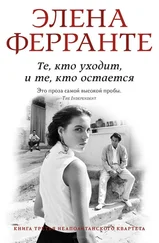
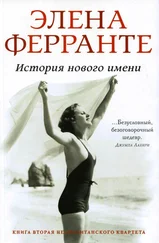
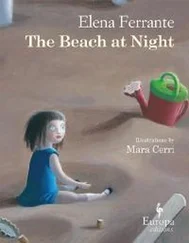
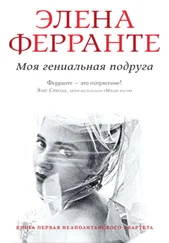
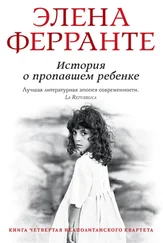
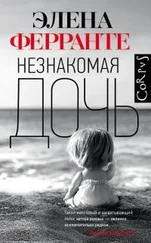
![Элена Ферранте - Дни одиночества [litres]](/books/404671/elena-ferrante-dni-odinochestva-litres-thumb.webp)

